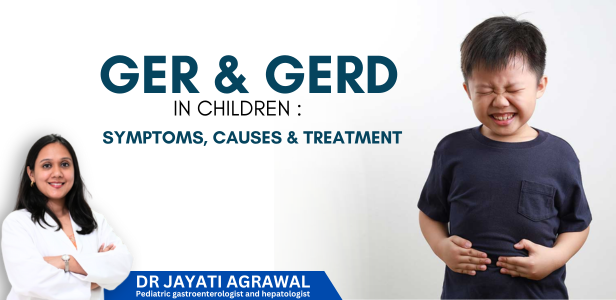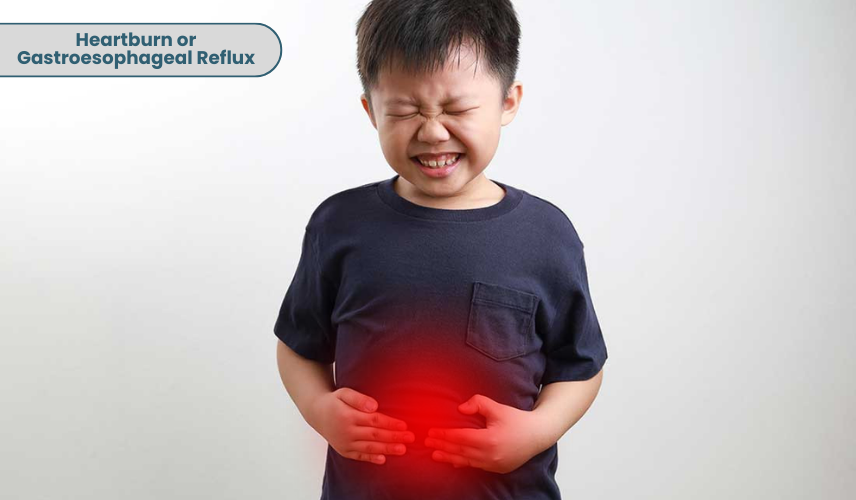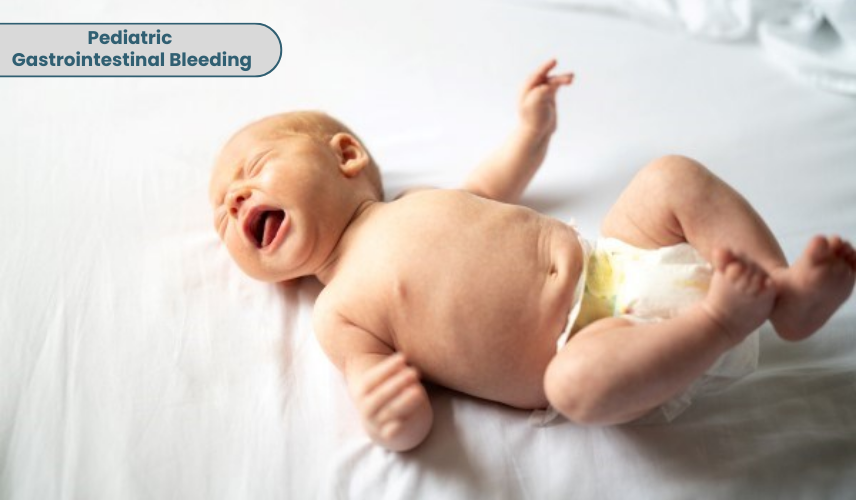GER & GERD in Children: Symptoms, Causes and Treatment
- By Dr Jyati

Gastroesophageal reflux (GER) and gastroesophageal reflux disease (GERD) are common conditions in children. GER is mild and often harmless. GERD, however, is persistent and may require medical care.
Understanding the difference between GER and GERD is key to effective treatment. This guide explains the symptoms, causes, diagnosis, and treatment options available for children of all ages.
What Is GER and GERD in Children?
GER occurs when stomach contents come back up into the esophagus. This is normal in infants and often resolves by 12 to 18 months.
GERD is more serious. It happens when reflux causes irritation, poor growth, breathing issues, or feeding problems. Unlike GER, GERD doesn’t improve without medical care.
Infants, toddlers, and older children can all be affected. The condition may be mild or severe, and in some cases, it can interfere with development or quality of life.
GER becomes GERD when it’s frequent, painful, or causes complications like vomiting, weight loss, or poor sleep.
Common Symptoms of GER and GERD in Children
Symptoms in Infants
- Frequent spitting up or vomiting
- Arching back during or after feeding
- Irritability after meals
- Poor feeding or refusal to eat
- Chronic cough or wheezing
- Poor weight gain
These signs may appear within the first few weeks of life. While occasional spit-up is normal, persistent symptoms should be evaluated by a pediatrician. Best Child GERD Specialist in Noida
Symptoms in Older Children
- Heartburn or chest discomfort
- Frequent burping
- Nausea
- Regurgitation of food
- Trouble swallowing
- Nighttime cough or sore throat
- Refusal to eat or eating small meals
Older children may be able to describe discomfort better. Look for patterns after meals or at night.
Causes of GER and GERD in Children
GER is usually caused by an immature lower esophageal sphincter (LES), which allows stomach acid to escape upward.
GERD can result from:
- Premature birth
- Obesity
- Neurological disorders
- Delayed stomach emptying
- Food allergies or sensitivities
- Hiatal hernia
- Family history of GERD
Certain triggers like large meals, chocolate, caffeine, or acidic foods can also worsen reflux.
Diagnosing GERD in Children
Diagnosis starts with a thorough medical history and physical exam.
If GERD is suspected, doctors may recommend:
- pH monitoring: Measures acid levels in the esophagus
- Upper GI series (X-ray): Shows structure and movement
- Endoscopy: Examines esophagus lining for damage
- Esophageal manometry: Tests muscle strength and function
Infants usually don’t need testing unless symptoms are severe or persistent. Best Child GERD Doctor in Noida
Treatment Options for GERD in Children
Lifestyle and Dietary Changes
- Feed infants smaller, more frequent meals
- Keep child upright for 20–30 minutes after eating
- Thicken formula with cereal (if advised)
- Avoid trigger foods (spicy, fried, chocolate, soda)
- Encourage weight loss if child is overweight
- Elevate head of bed for older children
These changes often reduce mild to moderate symptoms.
Medications
If lifestyle changes aren't enough, medications may help:
- Antacids (short-term use)
- H2 blockers (e.g., ranitidine, famotidine)
- Proton pump inhibitors (PPIs) like omeprazole
Medication use should be supervised by a pediatrician. Long-term use requires regular follow-ups.
Surgical Options
Surgery is rare but may be needed if GERD causes complications and doesn’t improve.
Nissen fundoplication is the most common surgery. It strengthens the LES by wrapping the upper stomach around the esophagus.
It's considered only after other treatments fail and symptoms are severe.
When to See a Doctor
Consult a pediatrician if your child:
- Spits up frequently and shows discomfort
- Has poor growth or weight loss
- Refuses to eat
- Has chronic cough or breathing issues
- Experiences chest pain or difficulty swallowing
Early evaluation helps prevent complications and ensures proper growth and development.
Tips for Parents Managing GERD at Home
- Track symptoms and food triggers
- Maintain consistent feeding and sleep routines
- Avoid secondhand smoke
- Use a wedge or incline to reduce nighttime symptoms
- Communicate with your child about their discomfort
- Follow up regularly with healthcare providers
Consistency and observation are key. Many children outgrow GERD, especially with proper management. Best Child GERD Treatment in Noida.
Conclusion
GER and GERD are common in children but vary in severity. While GER is often temporary and harmless, GERD requires proper medical care. If your child exhibits signs of reflux that interfere with eating, sleeping, or growth, consult a healthcare provider. Early intervention can help ensure healthy development and prevent complications.
If you suspect your child has GERD, don’t hesitate to consult a pediatric gastroenterologist for proper evaluation and treatment. Early intervention can help your child grow and thrive comfortably.
Need expert pediatric care for your child’s digestive health? Don’t wait—schedule a consultation with a Dr. Jayati Agrawal | Best Pediatric Gastroenterologist in Delhi NCR
Contact Us: 07827518110
FAQs About Heartburn and GERD in Children
Q1: Is GER the same as GERD?
Ans. No. GER is usually mild and resolves on its own, while GERD is more serious and persistent.
Q2: Can GERD go away on its own?
Ans. In infants, GERD often resolves as the digestive system matures. In older children, management is usually needed to control symptoms.
Q3: Are home remedies safe for kids with GERD?
Ans. Some home remedies like elevating the bed or changing diet are safe, but always consult your pediatrician before trying supplements or herbal treatments.
Q4: Does GERD affect a child’s growth?
Ans. If untreated, GERD can lead to poor appetite, malnutrition, and stunted growth. Early treatment can prevent these issues.
Q5: Can stress worsen GERD in children?
Ans. Stress and anxiety can increase acid production and worsen symptoms. A calm environment and emotional support are important.
.png)

